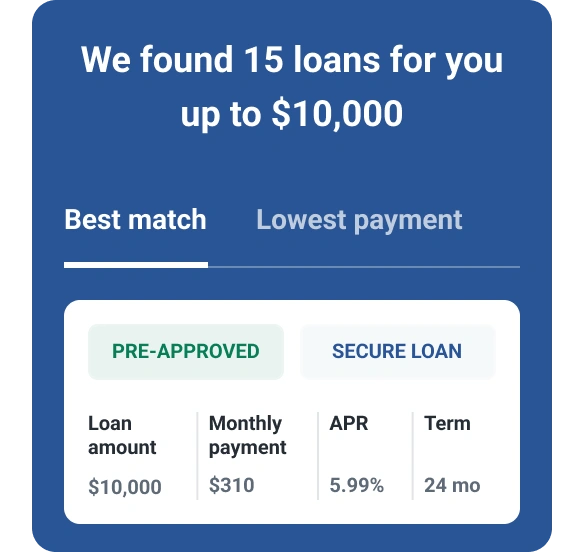How Do Personal Loan Interest Rates Work?
Quick Answer
Factors that affect personal loan interest rates include your credit score, income, debt-to-income ratio and the loan size and repayment term.
A personal loan is a versatile financial product that can be used for all kinds of things. Whether you're up against a surprise medical bill, a stint of unemployment or another unexpected financial hiccup, this type of loan can unlock funds relatively quickly.
Personal loans offer a great deal of flexibility and are available to borrowers with various credit scores—although interest rates may be higher if your score is lower. In addition to your credit scores, a number of additional factors can influence the interest rate you'll pay on a personal loan. Here's a breakdown of what you can expect.
How Do Personal Loan Interest Rates Work?
Let's first recap what a personal loan is: It is typically a collateral-free installment loan that provides cash that can be used for all kinds of financial needs, from consolidating debt to covering a home repair. Unlike a credit card, which is a form of revolving debt you can use to make purchases and pay them off at your own pace, a personal loan provides funds in one lump sum you repay with fixed monthly payments on a predetermined schedule.
Most personal loans are unsecured, meaning there's no collateral attached to them—not so with a secured loan, like a mortgage or auto loan. Secured loans are less risky for lenders because if the borrower defaults on their payments, the lender can repossess the asset used to secure the loan. This is part of the reason why interest rates tend to be lower for secured loans. The interest rate on any loan affects how much you'll be charged to borrow money over the life of the loan. Personal loans can have fixed or variable interest rates. With the latter, your rate can fluctuate over time.
You'll likely come across annual percentage rates (APRs) when researching personal loans. A loan's APR represents its total cost, including its interest rate and any other fees and expenses. This includes origination fees, which usually range anywhere from 2% to 5%.
Let's say you're seeking an $8,000 personal loan with an interest rate of 9% and a three-year repayment term. You'd pay a total of $1,158.32 in interest over the life of the loan. Now let's assume there's a 5% origination fee. This increases your costs by another $450. The APR, which includes the other fees charged on the loan, would be 12.78%. This is all to say that the APR provides a more accurate picture of what the loan will actually cost you.
Factors That Can Affect APR
A personal loan's APR is often shaped by many factors. Your credit score typically makes the biggest difference, and can even affect whether you're approved for the loan at all. Generally speaking, the better your credit, the easier time you'll have getting approved and the lower your APR. A lower credit score suggests to lenders that you're a riskier borrower. Lenders usually offset this added risk by charging higher interest rates. They might also consider the following factors when determining your interest rate:
- Income: Lenders want to be certain you have the means to make your monthly loan payment. If you have inconsistent income, it could result in a higher APR. Income isn't a factor in your credit scores, nor is it included on your credit reports, but lenders may ask for it as part of the loan application process.
- Debt profile: Most lenders will calculate the amount of your monthly income that's currently going toward debt payments. This amount represents your debt-to-income ratio and helps clarify your ability to repay your loan.
- Loan size: Since your interest rate is expressed as a percentage of your loan amount, you'll pay more with a larger loan. The amount you need to borrow may be out of your control, but it's worth considering as it'll impact your total costs. If possible, avoid borrowing more than you actually need.
- Repayment term: Opting for a shorter repayment term will result in a higher monthly payment, but it can help reduce your total interest over the long term.
What Is the Average Personal Loan Interest Rate?
Every lender is different, and average to good personal loan interest rates vary. That said, the average APR on a two-year personal loan is 9.58%, according to the most recent data from the Federal Reserve. That may seem steep, but credit cards are usually much higher. At the time of this writing, the average credit card APR is 16.3%.
Let's say you're looking to borrow $5,000 and pay it back over two years. Here's how the numbers could shake out if you used a credit card versus a personal loan.
| Personal Loan | Credit Card | |
|---|---|---|
| APR | 9.58% | 16.3% |
| Monthly payment | $229.76 | $245.53 |
| Total interest paid | $514.16 | $892.79 |
Even after accounting for a potential origination fee, the personal loan would still save you the most money over the long haul.
Personal loan calculator
How to Compare Personal Loans
Beyond the APR, you'll want to think about your ability to make your monthly payment. Can your budget absorb that bill without negatively impacting your quality of life? Make it a goal to make every payment on time, but it's wise to understand how late fees are structured just in case you end up missing a payment. Making a late payment can have a lasting effect on your credit and your ability to borrow in the future. A missed payment can drag down your credit score and stay on your credit report for up to seven years.
Assuming you can handle the monthly payment, it's always a good idea to compare rates and terms. Online lenders and credit unions, for example, tend to provide lower APRs than brick-and-mortar banks. Experian allows you to sort through personalized loan offers that match your credit profile. This makes it easy to compare APRs, fees and loan terms.
If you don't need the money right away, you could also take the time to check your credit report and improve your credit before applying for a personal loan. Doing so can make you a more attractive borrower who qualifies for a lower rate.
The Bottom Line
Many different factors influence the interest rate you'll get on a personal loan, but your credit is crucial. Experian Boost®ø is a simple tool that could improve your FICO® ScoreΘ powered by Experian data instantly. It can link your bills for your phone, utilities and certain streaming services directly to your Experian credit report. That means you can get rewarded for paying these bills on time each month.
Need a personal loan?
Whether you're looking to eliminate debt or access cash fast, compare personal loan offers matched to your credit profile.
Start now for freeAbout the author
Marianne Hayes is a longtime freelance writer who's been covering personal finance for nearly a decade. She specializes in everything from debt management and budgeting to investing and saving. Marianne has written for CNBC, Redbook, Cosmopolitan, Good Housekeeping and more.
Read more from Marianne

